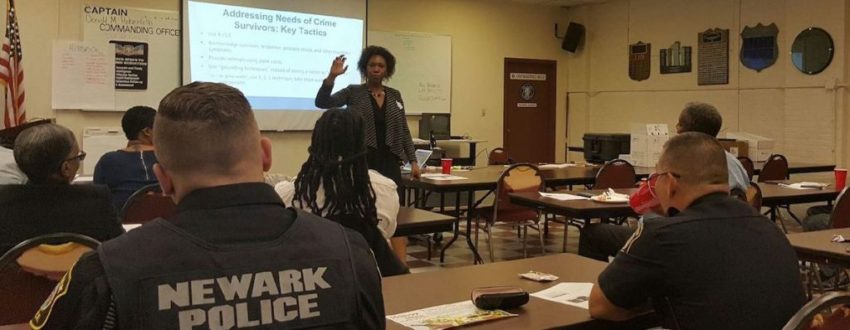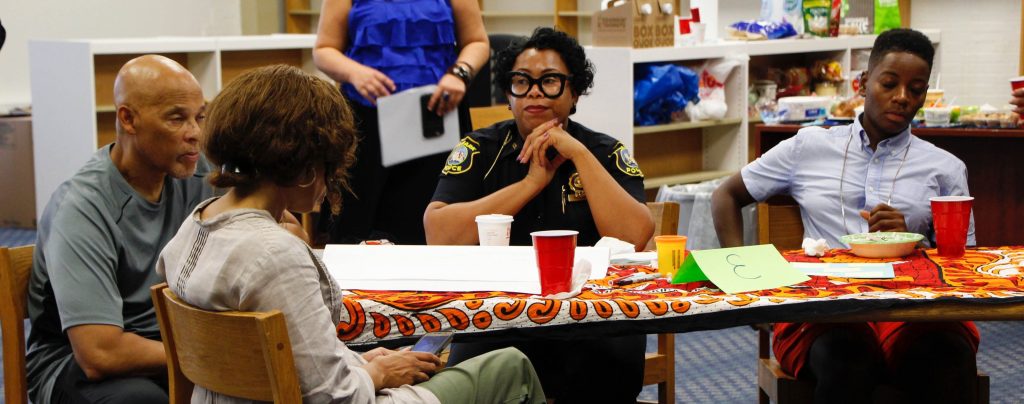
Share On Social!
Minorities don’t trust police. Police don’t trust minorities.
You can see this dynamic in any viral video of police-associated violence across the nation.
What is harder to see is how this “fraught relationship” impacts the mental, emotional, and behavioral health of both police officers and minorities like Latinos, according to a trustnottrauma.org report.
That’s why a new program is taking a new approach—trauma training—to rebuild police-community trust and relationships in Newark, N.J.
Why Newark?
Communities rely on police departments to “protect and serve.” The police, in turn, rely on community support and cooperation. But this model doesn’t always work in harmony, according to RAND.
Newark (34% Latino) is a prime example.
In 2011, New Jersey’s American Civil Liberties Union filed a misconduct complaint against the Newark Police Department. A three-year investigation by the Department of Justice found a “pattern and practice of unconstitutional policing.”
“Our investigation uncovered troubling patterns in stops, arrests and use of force by the police in Newark,” Attorney General Eric Holder said in a statement.
In 2016, Newark city leaders reached a settlement and agreed to comprehensive reform and change.
A New Kind of Reform
Law enforcement has public health consequences.
Police violence led to more than 1,000 deaths and 10,000 injuries in 2016. It also caused trauma and stress for police officers and communities of color, according to Human Impact partners, Medium reports.
In Newark, Equal Justice USA wanted to help deal with the trauma.
They launched a pilot program in 2016 to teach Newark police officers and civilians on how trauma impacts their daily lives.
The program—Police/Community Initiative on Trauma-Informed Responses to Violence—brings together police officers, community leaders, healthcare providers, and violence interrupters for honest conversations about trauma and violence.

Participants meet several times over a month for 4-hour discussions. They watch videos, work in teams, and have real discussions. They talk about how trauma impairs early childhood development and increases risk for truancy, dropping out of high school, substance abuse, and other risky behaviors.
“Difficult at first, these dialogues become transformative when both sides understand that is it the system itself that harms them,” said Fatimah Muhammad, Equal Justice USA’s trauma advocacy leader. “From there, they are ready to organize together and create powerful change. I’ve seen it over and over again. It moves me every time.”
Equal Justice USA’s program tries to ensure that:
- trauma survivors and witnesses have adequate resources and support in the wake of violence;
- police officers have skills to de-escalate and support those in need; and
- officers who experience what is known as secondary or vicarious trauma can adopt healthy practices for themselves.
How Did Reform Work in Newark?
In Newark, the Equal Justice USA program trained 117 police officers and 163 civilians, The Grio reports.
And it’s helping build trust between officers and civilians.
“In my [Newark police] officers, I see a desire to recognize the trauma in the community and to use that understanding to work together to reduce violence and help the victims. They really believe now that as a city we can get away from the ‘US vs THEM’ mentality. The community has been saying this for years. We, as a department, weren’t listening. We thought we knew it all – and that good policing was arresting the bad guys and being the warriors. Now we are listening. Now we understand that we are guardians of the community and we need to understand the root of the problem and be part of the solution,” said Newark Police Lt. Louis Forst, on the Equal Justice USA website.
In January 2018, The Grio published a video about the Police/Community Trauma Program.
“Collaboration between justice reform advocates and health advocates is essential to transforming the justice system to one rooted in healing, with racial justice and accountability front and center,” Muhammad said.
Extending Reform to the Nation
Newark, of course, isn’t alone.
Even as Equal Justice USA’s trauma training program tries to reduce police excessive force, racial profiling extends to even minor traffic violations, like failing to cross in a crosswalk.
For example, three journalists found that blacks received 55% of all pedestrian tickets in Jacksonville, while only accounting for 29% of the population. Of the 658 tickets issued for people crossing the street while not in crosswalk from 2012-2017, more than half (353) were issued in error. Topher Sanders and Kate Rabinowitz with ProPublica and Bejamin Conarck with Florida Times-Union, looked at racial disparities in the issuance of pedestrian citations and detailed their findings in Walking While Black story and video.
“This supports the fear that is in the African American community in Jacksonville and so many other communities,” Leslie Scott Jean-Bart, a Jacksonville lawyer, told Walking While Black.
“Now that we have the numbers, it’s time to talk about what are we going to be do about it?”
So what are you going to do about this?
By The Numbers
142
Percent
Expected rise in Latino cancer cases in coming years



